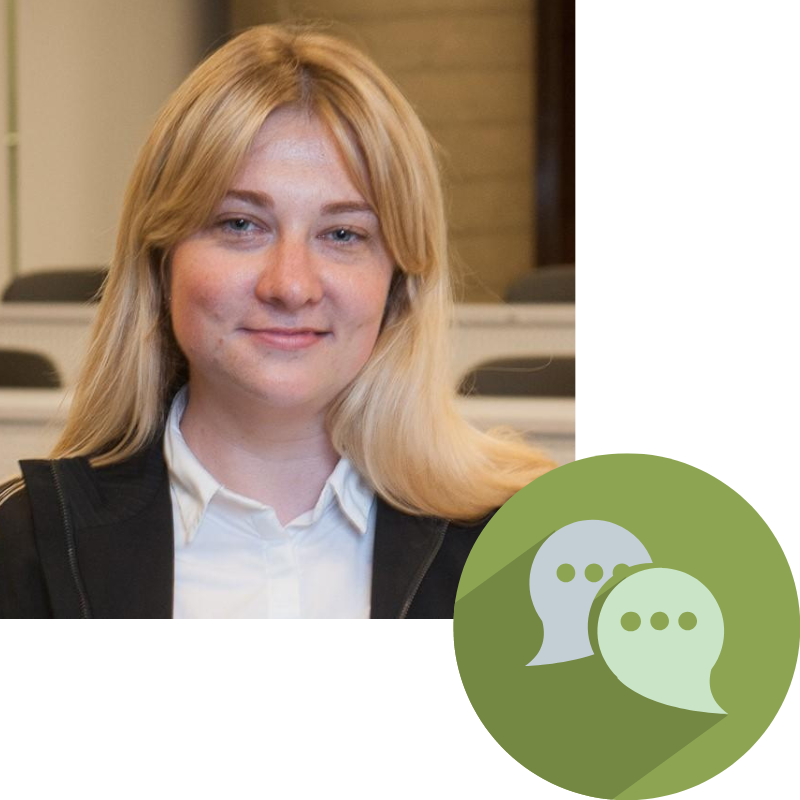Tell us about yourself.
My name is Olha Chernovol. I am a Ukrainian citizen who left Kyiv in March 2022 due to the Russian invasion of Ukraine. I am the author of 17 papers, in particular six articles published in the scientific journals of Ukraine in the field of law, three of which are included in international scientometric databases, and 11 papers published in international and scientific conferences.
During the past few years, I have worked primarily on matters related to integrity due diligence, anti-corruption, anti-money laundering, and financing terrorism in my role as a Project Coordinator at COSA LLC and as an Executive Director at the NGO Transparent Democracy.
Since 2020, I have been a member of the Ukrainian National Bar Association, which qualifies me to practice as an Attorney-at-Law. I have 7 years of experience in legal practice in different areas of law in Ukraine, such as civil, corporate, administrative, criminal, tax, banking, military, and labor law.
Tell us about your current research. What are you working on?
My plan for my postdoctoral fellowship at the University of Ottawa is to conduct research on a couple of topics that are related to, and complementary to, the research that my supervisor, Professor Jennifer Quaid has been doing on anti-corruption enforcement. My first project will be to examine the corruption risks that exist within the legal and institutional components of anti-corruption policy. I will begin the project with a study of the situation in Canada. This will enable me to gain an understanding of Canadian law and policy in this area while also contributing to the current debate about whether it is a good idea to create a specialized anti-corruption agency in Canada. After my study in Canada, I will go on to examine models of corruption prevention in other selected jurisdictions. This will contribute to the comparative component of Professor Quaid’s study.
In conducting my research, I plan to rely on a commonly used measure of the level of corruption in each country: the Corruption Perceptions Index (CPI). One of the goals of my study is to compare countries with low and high levels of corruption according to the CPI. I expect that my analysis of the legal and institutional components of the anti-corruption policy will reveal that even in countries with a CPI score that indicates a low level of corruption overall, the legal and institutional components of anti-corruption policies in these jurisdictions are not without shortcomings. I expect that by systematizing the peculiarities of different models of anti-corruption enforcement and how well they function, it will be possible to identify promising ways of improving the Canadian legislation on remediation agreements to better guard against possible corruption risks when the regime is applied in practice.
What influences your work?
In my work, I am inspired by Roman statesman, lawyer, scholar, philosopher, and academic skeptic Marcus Tullius Cicero. My favorite quote from Cicero is “Knowledge of the laws is not to remember their words, but to comprehend their meaning”.
Also, the principle that inspires me in my work is that when you set yourself a certain bar, the desire to achieve it inspires you. The right environment also always affects this component.
Do you have any advice for those who are currently completing their PhDs?
First of all, I want to advise you not to be afraid to start a PhD project, even if you hear from everyone that it is very difficult and exhausting. Only after you write your PhD thesis will you be able to appreciate how difficult it was or not!
Second, before you develop your PhD project, you have to sit and think about what components you might analyze in this project and make a list of steps which you have to develop for your project.
Third, you have to be patient and take it easy. You cannot rush a PhD.
Do you have publications that you would like to share with our community?
- MG. Petro Kopka, Olha Chernovol, Baltic-Black Sea Region Good Governance and Security Review, I Quarter 2021
Link (PDF, 24.9 MB) - Chernovol, Olha, “The mechanism of ensuring and implementing the basic duties of a person and a citizen: separate aspects”, Journal of the Kyiv University of Law. Kyiv, 2018. Issue 1. P. 57–60.
- Chernovol, Olha, “The Ukrainian model of legal provision and implementation of the duties of man and citizen”, Public Law. 2018. No. 2. P. 256–262.
- Chernovol, Olha, “Constitutional duty of man and citizen to protect the Motherland: the theoretical and practical aspects”, Legal Bulletin of the "KROK" University / "KROK" University of Economics and Law. Kyiv, 2016. Issue 23. P. 66–71.
What three words describe you best?
Persistent, Patient, Kind.
What are you currently reading?
I am interested in reading specialized legal literature on various matters. When I have time, I also like to read about non-legal topics. Right now, I am reading The President’s Daughter by Bill Clinton and James Patterson.

